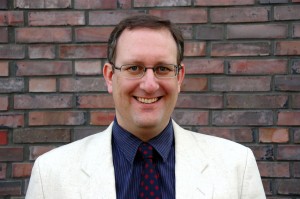What is the Impact of Cosmic Rays on Galaxy Formation?
European Research Council will fund HITS astrophysicist Christoph Pfrommer with an ERC Consolidator Grant with € 2 Million
HITS astrophysicist Priv.-Doz. Dr. Christoph Pfrommer has successfully applied for a Consolidator Grant of the European research Council (ERC). His research project CRAGSMAN – The Impact of Cosmic Rays on Galaxy and Cluster Formation“ will be funded for five years with about € 2 million. His grant proposal belongs to the panel “Universe Sciences”, in which 14 of the 372 grants were awarded, and only 3 to scientists in Germany.
“We are proud of this success”, says Klaus Tschira who established HITS in 2010 as a non-profit research institute, “because Christoph Pfrommer is already the third HITS scientist who has won an ERC grant.”
Understanding the physics of galaxy formation is arguably among the greatest problems in modern astrophysics. In the ERC-funded project, Christoph Pfrommer will investigate the impact of cosmic rays on galaxy and cluster formation. Cosmic rays originate in supernova explosions and produce galactic winds that slow down star formation to the small observed rates. To investigate the cosmic-ray propagation in galactic magnetic fields, Christoph Pfrommer employs the AREPO code that has been developed at HITS.
With the ERC funding, Pfrommer will establish a new research group at HITS. The group aims at modeling and simulating the galaxy and cluster formation processes to achieve an unprecedented combination of accuracy, resolution and physical completeness. He complements the theoretical efforts with a focused observational program, taking advantage of new capabilities at radio to gamma-ray wavelengths. This promises important and potentially transformative changes of our understanding of galaxy formation.
Pfrommer studied Physics in Jena (Germany), Harvard (USA) and at the Max-Planck-Institute for Astrophysics in Garching (Germany). After his Ph.D. at the LMU Munich, he worked as a postdoc und senior research associate at the Canadian Institute for Theoretical Astrophysics in Toronto. In summer 2010, he joined the “Theoretical Astrophysics” group at HITS (group leader Prof. Volker Springel) as a senior researcher. In January 2014, Christoph Pfrommer was the first active HITS employee to obtain the Habilitation at the Heidelberg University.
Christoph Pfrommer has won the third ERC grant for HITS. Prior to him, the astrophysicist Volker Springel (ERC Starting Grant) and the mathematician Tilmann Gneiting (ERC Advanced Grant) had successfully applied.
The Consolidator Grants of the European Research Council (ERC) fund projects of excellent scientists with 7 to 12 years of experience since completion of their Ph.D. The call for proposals is not limited to a specific topic, the sole criterion for selection is scientific excellence. Each project is funded with up to € 2.75 million.
Press Contact:
Dr. Peter Saueressig
Public Relations
Heidelberg Institute for Theoretical Studies (HITS)
Phone: +49-6221-533245
Peter.saueressig@h-its.org
www.h-its.org
Twitter: @HITStudies
Scientific Contact:
Priv.-Doz. Dr. Christoph Pfrommer
Heidelberg Institute for Theoretical Studies (HITS)
Phone: +49-6221-533271
christoph.pfrommer@h-its.org
About HITS
HITS, the Heidelberg Institute for Theoretical Studies, was established in 2010 by physicist and SAP co-founder Klaus Tschira (1940-2015) and the Klaus Tschira Foundation as a private, non-profit research institute. HITS conducts basic research in the natural, mathematical, and computer sciences. Major research directions include complex simulations across scales, making sense of data, and enabling science via computational research. Application areas range from molecular biology to astrophysics. An essential characteristic of the Institute is interdisciplinarity, implemented in numerous cross-group and cross-disciplinary projects. The base funding of HITS is provided by the Klaus Tschira Foundation.
